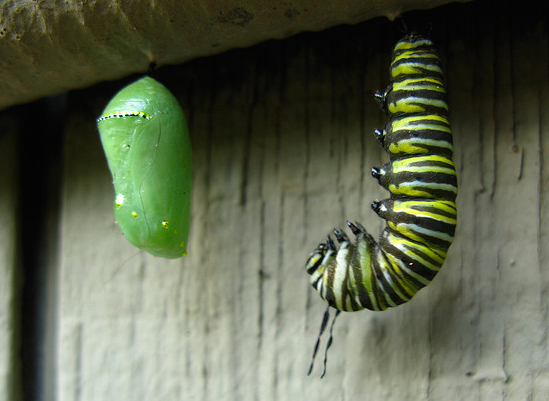Let Yourself Be Changed
Lisa Rowland: We, as a civilization, seem to have developed an identity trajectory that moves us from a place of openness and malleability to a “grown-up” and “mature” station where we hang on tightly to what we’ve got and avoid situations that might threaten all that we’ve achieved. As children, the whole world changes us. It’s new and wonderful and we are encouraged to try new things and learn all the way up through college. But once we’re out on our own, the message seems to change. Figure out what you’re going to do and do it. Once we’re settled in that place, there’s so much of our identity wrapped up in having arrived there that it’s terrifying to consider changing it! A mix of external messaging that tells us we’ve gotten what we came for and internal fear that we might lose what we have if we open ourselves up to change keeps us right where we are.

As adults, we often get frozen in our identities, unable to flow with the larger tides that guide us.
Image courtesy of Wikipedia.
Improvisors, on the other hand, study the art of being changed. A wise teacher told me once that rather than looking for ways to change my partner, I ought to enter a scene looking for opportunities to change. Stories revolve around characters affecting one another; around people being thrown off balance and coming to rest in a different place than they started. That’s how we know a story has been told. Something’s different. Someone’s been changed. On an improv stage, we welcome in that momentary imbalance necessitated in change in order to see what happens next. This might mean going along with someone’s idea, showing our vulnerability, giving up our status, or asking for help.
If more people approached life with an aim to look for what might change them, there’d be no limit to the depths of happiness that people might experience. They’d take that class they’d always been interested in, without the paralyzing fear of failure. They’d accept others’ ideas, and creative collaborations would flow like water! They’d listen deeply, empathize generously, and approach life with curiosity rather than suspicion. They’d welcome in uncertainty with the understanding that if they’re to discover anything new, they’ll inevitably travel through a zone of unfamiliarity. Hang in there! Let it change you. Find a new part of yourself, and allow yourself to be redefined, if that’s where the change takes you.
Patricia Ryan Madson: Changing or being changed . . . hmmmm. There is a world of difference between these two. In real life I notice what it is I want to change in myself and sometimes activate that choice. Most self-help books give us keys to this process. For example I need to get a handle on how I waste time in distractions on my IPhone. There’s a change I need to make. Perhaps I put a time window on when I’m allowed to have open the phone, other than when it rings. But the improv concept that we are studying here is about something fundamentally different. At the heart the issue is control . . . whose control. While I may be willing and even ready to change on my own most of us don’t like someone else making that decision for us. I would balk at having my husband hold my IPhone hostage in an attempt to change that habit for me.
So improv gives us opportunities to try on this way of working. Perhaps I’m playing a character who is a bullheaded kind of woman. She’s a CEO of a big corporation and is used to having things her way. In the course of the scene she meets a little boy who has been damaged by the product she manufactures. As she comes to know his story her veneer of arrogance melts and she offers to adopt the boy. We love seeing a “badass” turn soft and kind.
It’s easy to hang on to whatever you are doing/thinking. It takes little effort to stay right where you are. Change requires openness and action. Change brings adventure and surprises and new levels of living. And, improv allows us to experience what it feels like to be influenced and moved by others.
Ted DesMaisons: You both have reminded me how—again—improv teachings parallel those of Buddhism. Within that tradition, the Buddha taught, we generate so much of our suffering by resisting inevitable transition—or, at the other end of the spectrum, by trying to force it. Change represents one of the “seals” that holds life together. Fighting it means fighting reality. When we make peace with that truth, even embrace it, our mood relaxes and we exhale into noticing the beauty of the present moment.
Improv creates that learning lab where we can experience and enjoy the cauldron of change with little to no risk. When the “badass” opens her heart, the other players and the audience melt along with her. When the lowly servant finds a different dignity in the face of his overlord’s abuse, the whole house celebrates the status reversal. We embrace the change and come to see that it has results. As you mentioned, Lisa, the choice to let ourselves be affected makes a better story.
So what it is that makes us cling to the familiar, whether in life or on stage? Part of it, like you suggest, Patricia, is that change asks us to do something, to take responsibility for helping create a new world. We have to take more responsibility for the outcome of our story or our circumstance. Of course, we might also fail in the new effort. We might look clumsy or stupid. People might judge us or reject us. And then, we fear, we’ll be left alone.

Every caterpillar takes a faithful leap before becoming a butterfly.
Image courtesy of Flickr Sharing.
Ultimately, this question of letting ourselves be changed becomes a question of faith. Do we trust an unfolding scene—or life itself—to take care of us in the end? Do we trust ourselves to marshal the internal resources to grow into the change? Can we allow our stagemates and partners in crime to support us through whatever transitions happen? A caterpillar wraps itself in a cocoon that spells a certain kind of death, or at least a passing. But it’s that exact willingness that allows the butterfly to emerge. Letting ourselves be changed embraces that same, compelling life force. We dive into that dying, of sorts, and come out renewed.


I think change is the only constant in improv if everyone is doing their bit…Its like a very bendy road, where you can only see a little bit ahead, and you can only assume the road will continue